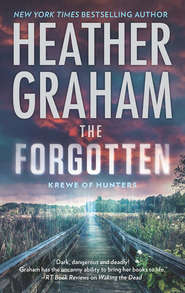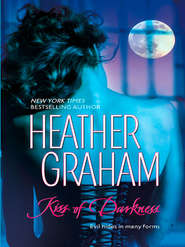По всем вопросам обращайтесь на: info@litportal.ru
(©) 2003-2024.
✖
Phantom Evil
Автор
Год написания книги
2019
Настройки чтения
Размер шрифта
Высота строк
Поля
Angela walked toward the door and turned the handle.
The door opened, and darkness stretched before her. The basement.
Andy Devereaux appeared to be easy and low–key, something that probably served him well when interrogating suspects. His voice lulled. He was soft–spoken. Everything about him seemed easy—except that he had the sharpest gaze known to man. And like a lazy–looking, tail–twitching great cat, he could move in the blink of an eye. The uniformed officers at the station seemed to like and respect him.
Jackson stayed at the station long enough to meet some of the district personnel with whom he might come in contact when exploring all angles of the Holloway case, and then Andy drove him back to the house on Dauphine. Jackson realized that he was lucky; Devereaux seemed to like him.
Andy loved the city of New Orleans, and he loved being a cop. He wanted Jackson to understand the city, and the police force. “This department is a damn good one, and believe me, it’s had its ups and downs, and we still go through some hell now and then—God knows, things that test a man’s patience to the core. Katrina, the oil spill—we just get on our feet again and get knocked down, so you’ve got destruction, desperation and poverty, and all of them clashing together. Some folks love the city, some folks just sweep down to make a living on the misfortunes of others. We had a force down here early on, early 1800s, and then just like now, some years were good, the city was organized and reorganized—the French Quarter, Vieux Carré, that’s the original city—but the Marigny came in on it early, just like the area we call the CBD now, Central Business District. And the Americans came in to form the Garden District—or the ‘English’ area. Anyway, they get a police force going, but along came the Civil War. By 1862, the Union had taken over and you have military rule. Then, the war ends, and carpetbaggers sweep down. Lincoln is dead, and Johnson isn’t really sure he wants black men to be equal with white men, but the ball is rolling. For years, that ball bounces up and down, equality—kill the upstart Africans—equality, no not really, just don’t own the man.” He glanced sideways at Jackson. “I don’t have any chips on my shoulder. History is history,” he said.
“Amen,” Jackson told him. “Remember when we were talking earlier and you asked me if I believed that a ghost had pushed Regina Holloway over the balcony? Well, I said no, and I meant it. But I think that people can play on the emotions of others with the power of suggestion, and the history of the house is tremendously important in that respect. And the history of the New Orleans police force fits right in there, because everything written about Madden C. Newton suggests that he managed to get away with all those murders because the city was in such a knot—emotionally, socially and governmentally—when he was committing the killings.”
Andy nodded and pulled the car to a stop on the side of Dauphine in front of the house. “Best hamburgers in the world about three blocks from here on Esplanade,” he said. “A place called Port of Call. Seriously, best burgers anywhere, and best potatoes, go figure.”
“Thanks again,” Jackson said, exiting the unmarked police car.
Andy drove off.
Shadows had settled around the house. Though it was in excellent shape, it carried a poignant hint of the decaying elegance that made up so much of the city.
He walked up the steps to the porch—Angela Hawkins should have arrived by now. He unlocked the front door, calling out, “Hello,” as he did so, not wanting to startle anyone with his presence. He stepped into the grand ballroom or parlor. The great chandelier was lit, casting a haunting glow over the sheet–draped furniture.
“Hello?” he called out.
The woman was here; a big shoulder bag and a carry–on suitcase sat by the door. She traveled like a cop, he noted. Light.
“Miss Hawkins?” he said, his voice loud and strong.
Still, there was no answer. Of course, the place was huge.
He went up the stairs first, following the horseshoe, thinking she might be choosing a bedroom for the stay. But she wasn’t upstairs, so he came down to the kitchen. “Miss Hawkins?” he said again. She wasn’t there either, but she’d left a book on the table; an old one. He looked at the title. Madden C. Newton: The True Story of New Orleans’s Own Jekyll and Hyde.
He leafed through it. Interesting, and surely, almost impossible to acquire.
Where the hell was she?
The courtyard caught his eye, and he looked out, for a moment dreading the possibility that he might see a body smashed and broken on the ground. But there was no one outside—no bodies lay on the bricks.
“Miss Hawkins?”
As he spoke, he heard a whack. The sound was hard. Like an ax hitting wood, or…a pickax slamming into hard ground.
He hurried to the nearest door and threw it open, once again, strange and deadly visions coming to his mind despite his perpetual search for rationality.
She found the ghost of the ultimate evil in man. Madden C. Newton. And the ghost had taken form and shape, and was hacking up the elusive Miss Hawkins…
Whack, whack, whack.
“Miss Hawkins!”
Wooden stairs led down to a shallow basement. Someone indeed had a pickax, and looked as crazy as all hell.
Angela Hawkins was attacking the floor with a pickax and a vengeance. The dry dirt floor just beneath the staircase.
CHAPTER THREE
“What the hell are you doing?” He might have been a fool to race down the stairs to accost her—she knew how to hold an ax. The basement held an incongruous sight. Angela was about five foot eight and slender, though shapely. Despite her height, she was almost fragile in appearance. She paused for a moment, staring at him with enormous, bright blue eyes that belonged on an anime character.
Ah, great! He was being given the nut–job assignment. He should have said no. He should have just resigned, and headed off to work the casinos.
Angela remained frozen for a second longer, obviously a bit disconcerted by being discovered at her task.
“Um—hi! I’m Angela Hawkins. You must be Jackson Crow.” Maintaining a grip on the pickax with her left hand, she offered her right in a strong handshake.
“Yes, hi, nice to meet you.” The words seemed a bit ridiculous. At least she wasn’t swinging the ax at him.
He hoped he betrayed nothing in his expression. Did she know about him? That he had taken down the Pick–Man?
Was this a test?
He tried not to sound as hard and angry as he felt when he spoke.
“I’m Jackson Crow. And—sorry, excuse me, but what are you doing?”
She shrugged ruefully. Her soft–knit, cap–sleeved dress completed the perfect picture of sensuous femininity, which seemed so opposed to the strength of her handshake—and her prowess with a pickax. But then, she’d recently gone through the rigors of a Virginia police academy, so she must be in excellent physical shape. She’d been through a lot, the death of her parents, and the death of her fiancé. Maybe she had been through too much.
There didn’t seem to be a crazed light in her eyes. Which was a positive sign.
“I’m looking for a body,” she said.
“Dead—I’m assuming.”
She nodded. “Yes, or bones, I guess. I’m not sure what would happen to a body buried down here for over a hundred years.”
“And there’s a reason you think you’re going to find a body buried down here? The house has gone through a great deal of construction over the years. The bodies buried here were discovered over a hundred years ago,” he told her.
“Ah, some, but not all,” she said. “I’m looking for the body of a man named Nathaniel Petti.”
“Petti—the fellow Newton bought the house from?”
“Yes.”
“No one knows what really happened to him,” Jackson reminded her.
“Yes, that’s why I’m looking for him,” she said. With a mighty swing, she hit the ground again.
Whack!
“We’re not here to tear the place down,” he said. “What makes you think that he’s under the ground there?”











